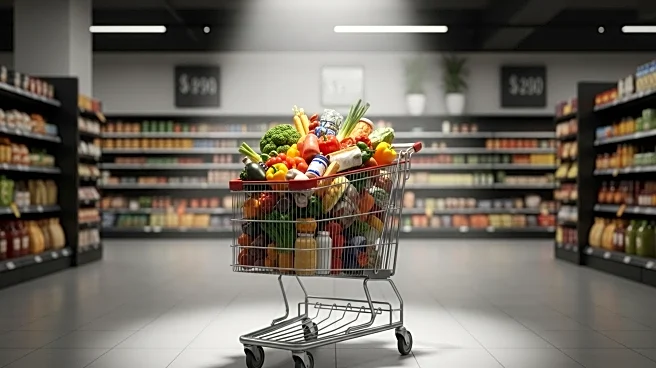What's Happening?
Grocery prices have increased by 3.2% over the past year, surpassing overall inflation rates. This rise is attributed to several factors, including tariffs imposed by President Trump, climate change, and labor shortages. The tariffs have particularly affected the prices of imported goods such as bananas and coffee. Consumers are feeling the impact, with many reporting significant stress due to the rising costs. For instance, Shelia Fields from Galveston, Texas, has resorted to shopping at multiple stores to find affordable food, avoiding meat purchases due to high prices. The situation is exacerbated by historical events such as the pandemic and geopolitical tensions, which have disrupted supply chains and increased food prices globally.
Why It's Important?
The increase in grocery prices is a significant concern for American consumers, as it affects their daily living expenses and financial stability. The stress caused by these rising costs is widespread, with over half of Americans citing grocery prices as a major source of anxiety. This situation has political implications, as President Trump has acknowledged the frustration over grocery prices as a factor in his political strategy. The tariffs, while intended to protect domestic industries, are contributing to higher consumer costs, highlighting the complex interplay between trade policies and consumer welfare. The ongoing price hikes could lead to changes in consumer behavior, such as increased reliance on cheaper alternatives and more frequent shopping trips.
What's Next?
Consumers may continue to adapt by seeking out sales, using coupons, and opting for store brands to mitigate the impact of rising prices. The grocery industry might see a shift towards smaller package sizes, a phenomenon known as shrinkflation, where products are reduced in size but sold at the same price. This could further alter consumer purchasing habits and increase scrutiny on pricing strategies. Additionally, political pressure may mount for policy changes to address the tariffs and their impact on food prices.
Beyond the Headlines
The rising grocery prices also have ethical and cultural implications, as they affect food accessibility and equity. Lower-income families are disproportionately impacted, potentially leading to increased food insecurity. The situation underscores the need for sustainable agricultural practices and resilient supply chains to withstand global disruptions.












